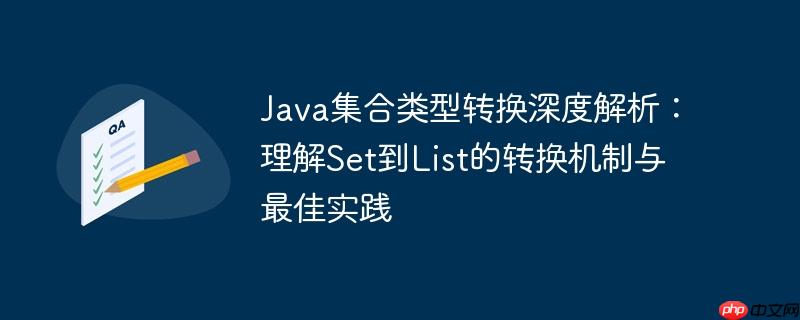
在java中,类型转换(type casting)并非总能成功,其核心在于对象的运行时类型(runtime type)是否与目标类型兼容。当我们尝试将一个hashset对象直接强制转换为list类型时,会遇到classcastexception,因为hashset和list是两个不同的接口,hashset类并未实现list接口。
考虑以下代码片段:
import java.util.*;
public class Main {
public static void main(String[] args) {
Set<Map<String, ?>> rows = new HashSet<>();
rows.add(new HashMap<String, String>() {{ put("1", "one"); }});
rows.add(new HashMap<String, String>() {{ put("3", "three"); }});
// 尝试直接强制转换,这将导致 ClassCastException
// printItems((List<Map<String, ?>>) rows);
}
public static void printItems(List<Map<String, ?>> items) {
for (Map<String, ?> str : items) {
System.out.println(str);
}
}
}这里,rows变量的声明类型是Set,其运行时类型是HashSet。由于HashSet并没有实现List接口,因此JVM在运行时无法将一个HashSet实例视为一个List实例。强制类型转换要求对象的运行时类型必须是目标类型或其子类型。
虽然不能直接强制转换,但我们可以通过构造函数来“转换”集合类型。例如,ArrayList的构造函数可以接受一个Collection类型的参数,从而创建一个新的ArrayList实例,其中包含原集合的所有元素。
import java.util.*;
public class Main {
public static void main(String[] args) {
Set<Map<String, ?>> rows = new HashSet<>();
rows.add(new HashMap<String, String>() {{ put("1", "one"); }});
rows.add(new HashMap<String, String>() {{ put("3", "three"); }});
// 通过构造函数创建一个新的 ArrayList 实例
List<Map<String, ?>> listedRows = new ArrayList<>(rows);
printItems(listedRows); // 这次调用成功
}
public static void printItems(List<Map<String, ?>> items) {
for (Map<String, ?> str : items) {
System.out.println(str);
}
}
}在这个例子中,listedRows的运行时类型是ArrayList,而ArrayList明确实现了List接口。因此,将listedRows作为参数传递给printItems方法是完全合法的。这里发生的不是类型转换,而是创建了一个新的、类型兼容的集合对象,并将其内容初始化为原始集合的副本。
立即学习“Java免费学习笔记(深入)”;
强制类型转换通常适用于以下场景:当你有一个编译时类型是父类或接口的对象,但你确定其运行时类型是某个更具体的子类,并且你需要调用该子类特有的方法时。
基本规则:
向上转型(Upcasting): 隐式发生,将子类对象赋给父类引用。这是安全的。
Object obj = "Hello"; // String 向上转型为 Object
向下转型(Downcasting): 需要显式强制转换。只有当对象的运行时类型与目标类型兼容时才成功。如果不兼容,会抛出ClassCastException。
Object obj = "Hello"; String str = (String) obj; // 成功,因为 obj 的运行时类型是 String // Object anotherObj = new Integer(123); // String anotherStr = (String) anotherObj; // 失败,运行时类型是 Integer
在进行向下转型前,通常建议使用instanceof关键字进行类型检查,以避免运行时错误。
public void processObject(Object o) {
if (o instanceof String) {
String s = (String) o;
System.out.println("处理字符串: " + s.toUpperCase());
} else if (o instanceof Integer) {
Integer i = (Integer) o;
System.out.println("处理整数: " + (i * 2));
} else {
System.out.println("未知类型对象");
}
}在设计方法时,如果仅需要对集合进行迭代或进行Collection接口定义的通用操作,最佳实践是使用更通用的接口(如Collection或Iterable)作为方法参数。这样可以使方法接受更广泛的集合类型,无论是Set、List还是其他Collection的实现类,从而提高代码的灵活性和复用性,避免不必要的类型转换或集合重建。
例如,将printItems方法修改为接受Collection类型:
import java.util.*;
public class Main {
public static void main(String[] args) {
Set<Map<String, ?>> rows = new HashSet<>();
rows.add(new HashMap<String, String>() {{ put("1", "one"); }});
rows.add(new HashMap<String, String>() {{ put("3", "three"); }});
// 现在可以直接传入 Set 对象
printItems(rows);
List<Map<String, ?>> listedRows = new ArrayList<>(rows);
printItems(listedRows); // 也可以传入 List 对象
}
// 方法现在接受任何 Collection 类型的参数
public static void printItems(Collection<Map<String, ?>> items) {
for (Map<String, ?> str : items) {
System.out.println(str);
}
}
}这种做法不仅避免了ClassCastException的风险,还使得代码更加健壮和易于维护。它遵循了面向接口编程的原则,将关注点放在了集合的行为上,而非其具体的实现类型。
理解Java中的类型转换机制,特别是运行时类型的重要性,是编写高质量代码的关键。HashSet不能直接强制转换为List是因为它们之间没有实现关系。通过构造函数创建新集合是一种有效的“类型转换”方式,但它实际上是创建了一个新对象。在大多数情况下,当只需要迭代或执行通用集合操作时,优先使用Collection或Iterable等更通用的接口作为方法参数,可以显著提升代码的灵活性和鲁棒性,是Java集合编程的推荐实践。
以上就是Java集合类型转换深度解析:理解Set到List的转换机制与最佳实践的详细内容,更多请关注php中文网其它相关文章!

每个人都需要一台速度更快、更稳定的 PC。随着时间的推移,垃圾文件、旧注册表数据和不必要的后台进程会占用资源并降低性能。幸运的是,许多工具可以让 Windows 保持平稳运行。

Copyright 2014-2025 https://www.php.cn/ All Rights Reserved | php.cn | 湘ICP备2023035733号